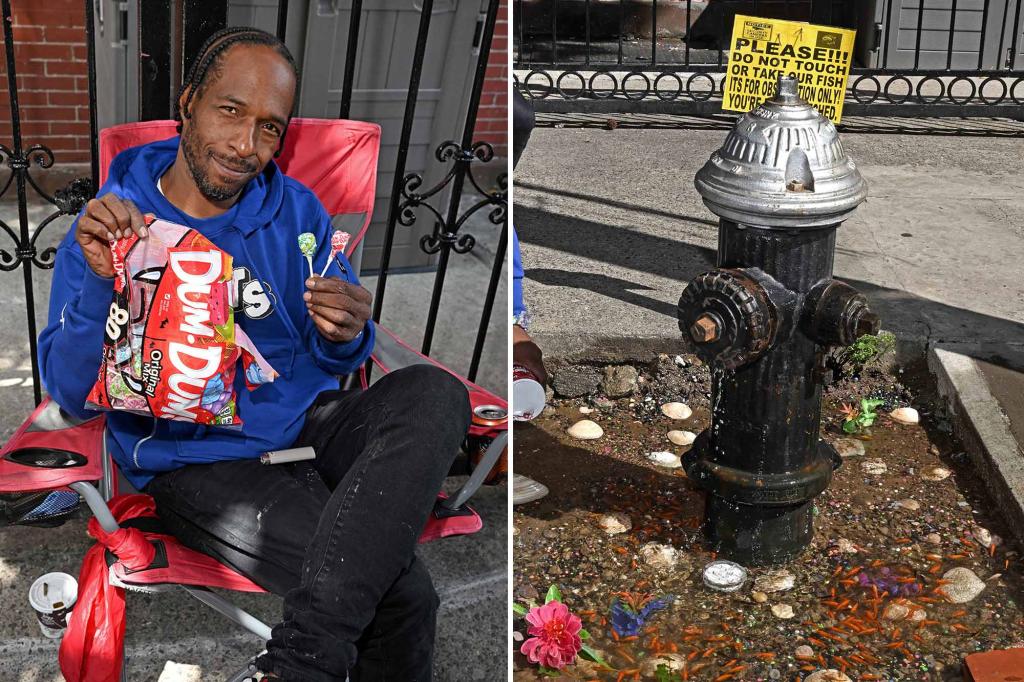Hajj Malik Lovick, a 48-year-old Brooklyn resident and co-creator of the viral Bed-Stuy “aquarium,” was sentenced to 12 years in prison on Friday for attempted murder. The sentencing followed a December conviction stemming from a June 2023 shooting outside a local bar. Lovick’s case presents a stark contrast: a man celebrated for fostering community spirit through the whimsical sidewalk fish pond, simultaneously facing severe consequences for a violent act that endangered the very community he claimed to champion. This duality formed the crux of the arguments presented during his sentencing hearing.
Lovick’s defense team emphasized his contributions to the Bedford-Stuyvesant neighborhood, highlighting his role in creating and maintaining the beloved aquarium. The makeshift pond, built in a cracked sidewalk and populated with goldfish, garnered significant attention and became a local attraction. The defense portrayed Lovick as a dedicated community member, organizing back-to-school drives, goldfish adoption programs, and actively working to prevent drug activity in the area. They argued that his community involvement warranted leniency in his sentencing. His attorney even went so far as to suggest that Lovick’s efforts to create a positive community space somehow mitigated his violent act.
However, the prosecution challenged this narrative, pointing out the ironic proximity of the aquarium to the scene of the shooting. They emphasized the gravity of Lovick’s actions, recounting the events of the night: an initial altercation at the Lover’s Rock bar, followed by Lovick retrieving a gun from a nearby building and firing two shots at the victim and a crowd of bystanders. This premeditated act, they argued, demonstrated a blatant disregard for public safety and could have resulted in multiple fatalities. The prosecution underscored that Lovick’s creation of the aquarium did not absolve him of the serious crime he committed. They pushed for a sentence that reflected the severity of the crime and the potential harm caused to the community.
Judge Jane Tully, presiding over the case, appeared unconvinced by the defense’s arguments. She expressed astonishment that Lovick’s community ties were being presented as mitigating factors, given the inherent danger he posed to that same community by firing a gun into a crowd. Tully emphasized the premeditated nature of the shooting, noting Lovick’s conscious decision to leave the scene, arm himself, and return to fire at the victim. The judge’s words reflected a firm stance against gun violence and a commitment to holding perpetrators accountable, regardless of their perceived positive contributions to the community.
The sentencing drew a mixed reaction. While nearly two dozen supporters, including the aquarium’s co-creator Je-Quan Irving, attended the hearing in a show of solidarity, the Brooklyn District Attorney’s office issued a strong statement condemning Lovick’s actions. District Attorney Eric Gonzalez emphasized that the sentence sends a clear message about the unacceptability of gun violence in Brooklyn. He highlighted the borough’s recent progress in reducing shootings and reiterated the commitment to holding individuals accountable for endangering public safety. The DA’s statement served as a reminder that community contributions do not excuse violent acts and that the justice system will pursue appropriate consequences for such crimes.
The Bed-Stuy aquarium, once a symbol of community spirit and resilience, now stands as a complex reminder of the multifaceted nature of individuals and the intricate relationship between community building and personal accountability. The aquarium’s journey, from its humble beginnings in a cracked sidewalk to its upgraded, solar-powered iteration, mirrors the trajectory of its co-creator, from community figure to convicted felon. The future of the aquarium remains uncertain, mirroring the uncertainty surrounding how the community will reconcile Lovick’s dual roles as both a creator of something positive and a perpetrator of a violent act. The aquarium’s existence, even in Lovick’s absence, continues to spark conversation about the complexities of community, individual action, and the consequences of violence.
The case of Hajj Malik Lovick raises important questions about how we evaluate individuals’ contributions to society in the context of their transgressions. While his efforts to create a positive community space through the Bed-Stuy aquarium are undeniable, they cannot erase the gravity of his violent act. The 12-year sentence handed down by Judge Tully underscores the principle that accountability for criminal behavior remains paramount, irrespective of other positive contributions. The story of the Bed-Stuy aquarium and its creator serves as a cautionary tale about the complexities of human nature and the delicate balance between celebrating community spirit and upholding justice.










